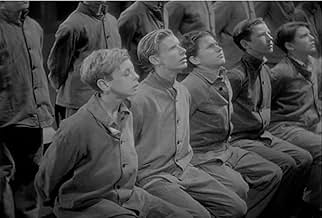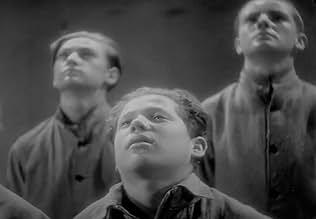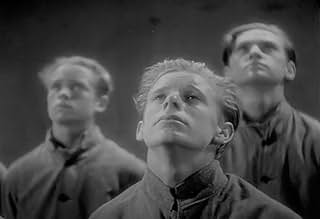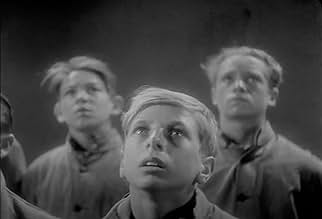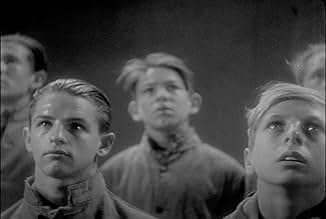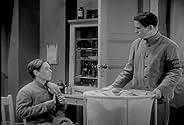Jimmy idolizes bootlegger Matt, and when he refuses to implicate his friend, he is sent to reform school. He befriends Shorty, a boy with a heart condition, and escapes to let the world know... Read allJimmy idolizes bootlegger Matt, and when he refuses to implicate his friend, he is sent to reform school. He befriends Shorty, a boy with a heart condition, and escapes to let the world know about the brutal conditions.Jimmy idolizes bootlegger Matt, and when he refuses to implicate his friend, he is sent to reform school. He befriends Shorty, a boy with a heart condition, and escapes to let the world know about the brutal conditions.
- Director
- Writers
- Stars
- Awards
- 2 wins total
- Jimmy Mason
- (as Junior Dirkin)
- Shorty
- (as Junior Coughlin)
- Henry Clark
- (as Charles Grapewin)
- Judge Robinson
- (as Wallace Clark)
- Superintendant Charles Thompson
- (as James Marcus)
- Lucy Mason
- (uncredited)
- Boy at Trial
- (uncredited)
- Reformatory School Inmate
- (uncredited)
- …
- Reformatory School Inmate
- (uncredited)
- …
- Reformatory School Inmate
- (uncredited)
- Detective
- (uncredited)
- Cop on the Beat
- (uncredited)
- Director
- Writers
- All cast & crew
- Production, box office & more at IMDbPro
Featured reviews
Needs Cleaning, But Not Bad
Mordaunt Hall observed, "The attempt to pillory reform schools is hardly adult in its attack, but it has a few moderately interesting interludes. The direction of this film is old-fashioned. Pat O'Brien gives a forced performance. Young Durkin's playing is sincere and likewise that of Bette Davis as Peggy."
The biggest problem with this film is how poorly the physical film itself has held up. The Library of Congress has done a great job cleaning it, but it remains a bit of a mess, particularly in the first act. Hopefully some day a better print will be found. The story itself is decent, and tells another angle on the whole gangster theme: what of those who are not gangsters but keep their mouths shut on their behalf?
Vintage reform school drama
The story opens at a farm where Jimmy Mason (Junior Durkin) helps his widowed mother (Mary Alden) with the chores. The pleasant day turns out tragically when Mrs. Mason is suddenly struck and killed by a passing automobile. Left alone, Jimmy decides to come to the city and live with his Uncle Henry (Charley Grapewin) and Aunt Emma (Emma Dunn), landlords of an apartment building. There he meets one of their tenants, Matt Kelly (Pat O'Brien), who befriends the boy, and later introduces him to his girlfriend, Peggy (Bette Davis), a tough babe with a good heart, who takes an instant liking to this young teen. Jimmy, however, is quite naive and doesn't realize that Kelly is a smooth-talking, small-town operator and racketeer. Jimmy is soon offered a job by Kelly answering the telephone at his bootlegging headquarters. After showing him what to do and say, Kelly leaves Jimmy alone to tend to business. As Kelly slowly drives away, he looks at his rear view mirror to find the police barging in the place and arresting Jimmy. While in juvenile court, Jimmy believes that Kelly will come and speak on his behalf, and be released (no such luck). He refuses to identify Kelly as the man who hired him to the judge (Wallis Clark). Because of this, Jimmy is sentenced to three years in a state reformatory. While there, Jimmy becomes the victim of a cruelly-operated institution.
The supporting cast includes Junior Coughlan as Shorty, a reform school boy with a heart ailment who befriends Jimmy; Morgan Wallace as Frank Gebhardt, a crusading publisher wanting to improve reform school conditions; and James Marcus as the superintendent. While the opening credits presented on TV or video today give Davis and O'Brien star billing over Junior Durkin, the current opening credits are actually taken from reissue prints that capitalized on the stardom of both Davis and O'Brien, and is not the original opening credits as presented to 1932 audiences, hence the misspelling of Durkin's surname spelled Dirkin.
Although a reform school drama like this had been produced numerous times by other studios throughout the 1930s, "Hell's House," is really nothing new, in fact, a trifle slow at 70 minutes, handicapped by low-budget production values. Acting is good and reform school situations are grimly handled. However it's still interesting to see mainly because of the supporting actors of O'Brien and Davis, both of whom would become major film stars in later years, especially at Warner Brothers. (**1/2)
Worthwhile Material Helps Make Up for Weaknesses Elsewhere
Junior Durkin plays a young man who in all innocence becomes involved with a charismatic bootlegger during the days of prohibition. Jimmy (Durkin's character) is arrested for being in the wrong place at the wrong time, and is sent to reform school, where things get worse. Some of the plot developments are not all that logical or plausible, but the story works in calling attention to the way that the young offenders are often treated simply as annoyances to be minimized, with insufficient attention given to constructive development.
Pat O'Brien is effective as the bootlegger, and Davis, though cast as a stock character, has a few good moments as his tough-minded girlfriend. The rest of the supporting cast, which features Charley Grapewin and Junior Coghlan, is solid, and the story moves at a good pace. Overall, it's a little above average for its time and genre, and it contains some ideas worth thinking about.
The Lost Boys
After arguing over who gets top, Durkin befriends bunkmate Frank "Junior" Coghlan (as "Shorty"), who has a heart ailment. Conditions in the reformatory are terrible. The boys have a plan to spring Durkin, but young Coghlan is caught. While his pal lies close to death, in solitary confinement, Durkin breaks out to enlist O'Brien's help in finding suitable doctors for Coghlan. But, O'Brien doesn't want to get involved, or he'll have to leave pretty Bette Davis (as Peggy Gardner) for prison...
Howard Higgin's "Hell House" was relatively ahead of the juvenile reformatory curve, and boasts several points of interest.
First off, you have the two "Juniors" Durkin and Coghlan in the same picture, comparable to the 1980s "Coreys" Haim and Feldman. Durkin even looks a little like Feldman. Unfortunately, Durkin died in a car accident. Coghlan's supporting performance upstages even Ms. Davis - and, you will see Davis get her hair messed up as O'Brien tell her, "I just washed my hands and I can't do a thing with 'em!" Note, this was before Davis uttered her famous trademark response, "I'd like to kiss ya, but I just washed my hair" (see "The Cabin in the Cotton"). Finally, you have a delirious Coghlan "talking" to his dead mother quite credibly in one scene - and, in the end, Durkin's deathly "conversation" gives the story startling emotional closure.
******* Hell's House (1/30/32) Howard Higgin ~ Junior Durkin, Frank Coghlan Jr., Pat O'Brien, Bette Davis
EARLY bette davis...
Did you know
- TriviaBette Davis's first starring role.
- Quotes
Peggy Gardner: If you'd give the kid a chance, Kelly, he might amount to something, instead of always thinking about yourself.
- ConnectionsFeatured in V.I.P.-Schaukel: Episode #6.1 (1976)
- How long is Hell's House?Powered by Alexa
Details
- Runtime
- 1h 12m(72 min)
- Color
- Aspect ratio
- 1.37 : 1




